A song entitled "Torture Tactics" was initially included on Oppressing, and 20,000 copies were printed but eventually destroyed over objections to the lyrics from the distributor, Atlantic Records. The song was included with subsequent reissues of the album, though. In '91, Vio-lence released an EP called Torture Tactics with three un-released tracks from the Oppressing sessions and one live track from the tour. The following year Flynn left to form Machine Head when the other band members objected to his forming a side project. Feeling un-fulfilled musically by Vio-lence, Flynn made Machine Head a full-time band rather than a side-effort. Together with bassist Adam Duce, Flynn recruited guitarist Logan Madder and drummer Tony Costanza and Machine Head was born.
With the lineup complete, Machine Head scraped together $800 to record a demo in a friend's house. The demo wound up in the hands of a Roadrunner Records executive, who rushed to sign the new band, and headed into the studio to record their debut release. Burn My Eyes hit store shelves in 1994, but those shelves emptied fast as the set quickly became Roadrunner's best-selling debut, and maintaining the distinction for five years. Roadrunner shipped 400,000 copies of the album and critics raved about it. Flynn had more control than he had on Vio-lence releases, handling vocal duties and lyrics, which covered topics such as the 1992 L.A. Riots and the 1993 siege of the Branch Davidian compound in Waco, Texas. Burn My Eyes cemented Machine Head as one of the pioneers of the emerging "New Wave of American Metal" movement.
|
On the heels of the release of their debut effort, Machine Head hit the road in support of Slayer. In just a few months, however, the band became popular enough to headline, so another tour was booked to start right after the first. After three long years of touring almost non-stop, the band returned to the studio to begin laying down its sophomore effort. The More Things Change... hit stores in March 1997, expanding on the success of Burn My Eyes. The album charted on the Billboard 200 albums chart, peaking at position 138; something not achieved by Burn. Two more years of touring ensued, followed by a third album, The Burning Red, which debuted in August 1999.
The Burning Red marked a change in sound for Machine Head in the form of a shift toward Nu Metal, a new movement combining heavy metal with hip-hop elements. The album featured several songs with rap vocals, an element not appreciated by the group's base fans. The set was successful, however, debuting at position 88 on the Billboard 200 and eclipsing the band's previous efforts in worldwide sales. Another round of touring followed, and the band's fourth album Supercharger dropped in October, 2001, reaching the 115 spot on the Billboard 200. Core fans were disappointed again, however, expecting a return to the groove metal sound of the 1st 2 Machine Head releases and getting a continuation of the the Nu Metal sound heard on The Burning Red.
|
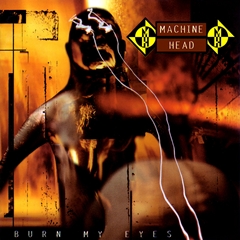 Burn My Eyes
Burn My Eyes
1994 |
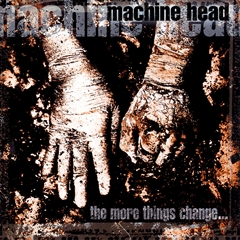 The More Things Change...
The More Things Change...
1997 |
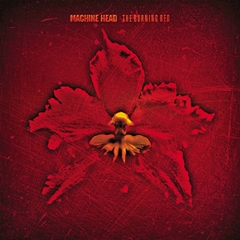 The Burning Red
The Burning Red
1999 |
Just before Supercharger hit the shelves, the single "Crashing Around You" hit the airwaves and a video was produced. MTV refused to play the video, because of the imagery in the video. Timing was unfortunate in this case as the single premiered just a week before the tragic 9/11 terrorist attacks and the video depicted the San Francisco skyline in flames. The image was viewed as potentially insensitive in the aftermath of the tragedy and the video was pulled by MTV. The song became a live favorite, however, and was included on the first Machine Head live album, released two years later.
By 2002 Machine Head had already sold a combined 1.3 million records for Roadrunner Records, who nonetheless decided to cut funding for Machine Head promotions. The parties mutually agreed to part ways with regards to American distribution and the live album Hellalive was recorded to settle contractual obligations. The band's foray into Nu Metal did open up a new audience for Machine Head, but alienated core fans and its label, though Roadrunner International still handled distribution outside the USA. The band spent the next year or so writing, recorded a four-track demo and shopped it to record labels. They entered the studio in June 2003 to begin working on album number five, dropping Through the Ashes of Empires internationally in December. The band finally got a deal for American distribution, ironically, from the same label they'd just left. Under the new Roadrunner USA deal, however, Machine Head owned all of the music.
|
|
|
Through the Ashes of Empires hit US record stores on April 20, 2004, four months behind the European release, with a bonus track included as a consolation for the prolonged wait. The gap heightened the excitement for the effort as reviewers were almost unanimously hailing it as a return to Machine Head's groove metal roots. The album debuted at position 88 on the Billboard chart and is considered a perfect representation of the growth band at that point. While it does bring back the groove metal sound of their first two efforts, it also retained elements of the Nu Metal style displayed on albums 3 and 4. The effort was ranked at No. 311 on Rock Hard magazine's The 500 Greatest Rock & Metal Albums of All Time list.
With fans and critics alike responding favorably to the new album, Machine Head filmed a video for the song "Imperium," and MTV placed it into heavy rotation, no doubt feeling at least a little bad about the circumstances around the banning of "Crashing Around You." The band launched an extensive headlining tour with stops at all the major metal festivals. The tour included the 2005 Wacken Open Air festival, where the band played in front of a crowd of 40,000, its largest headlining audience to date. Machine Head was back, and kept the momentum rolling with record 6, The Blackening, released March 27, 2007. The effort debuted on the Billboard chart at position 53 with first week sales in excess of 13,000. It was not only the band's highest entering position on the chart, it was the highest position Machine Head had reached period. The album also reached the top 20 on several European charts.
|
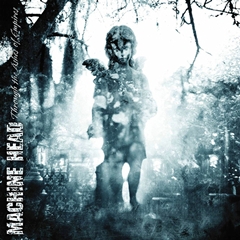
Through the Ashes of Empires
2004 |
|
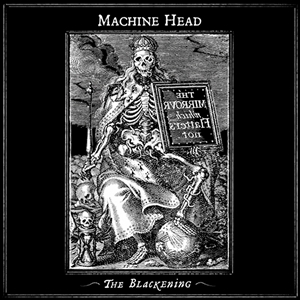
The Blackening
2007 |
|
With copies of The Blackening flying off shelves, Robb Flynn was recognized for lifetime achievement when he was awarded the Metal Hammer Golden God Award in June 2007. The Blackening was also recognized during the ceremony in the Best Album category. Flynn was certainly deserving of the Golden God honor, but maintained a different schedule than someone you'd expect to get a lifetime achievement nod. Machine Head maintained a heavy touring schedule for the next 3 years and five months, finally taking a break in October 2010 to get started on a seventh album.
The band hit the studio in April the following year, but the break wouldn't last long as the band hit the road again a few months later to co-headline the Rockstar Energy Mayhem Festival. The impending album's first single "Locust" was debuted during the Mayhem festival, and released on iTunes and Amazon on June 14th. Unto the Locust hit stores to critical acclaim September 27, 2011, and quickly became the band's biggest commercial success as well. The album reached No. 22 on the Billboard chart, the band's highest position yet; and reached the 5 spot on the German chart, its highest position on any chart. The band also used the time off during a break from the Mayhem Fest to film a video for "Locust," a video that's been hailed for groundbreaking CGI animation and production.
|
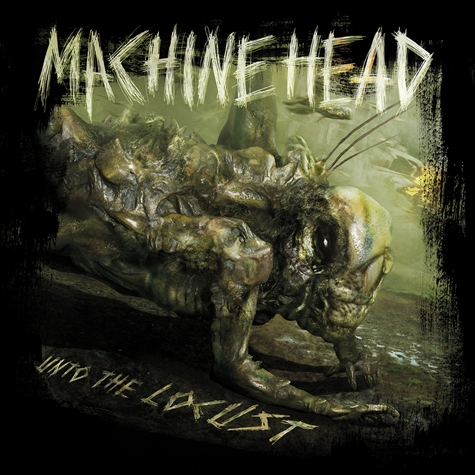
Unto the Locust
2011
|
|
Unto the Locust was almost universally lauded by critics, earning a score of 91 out of 100 based on the average grade from six reviewers on Metacritic. The album's first-week sales of 17,000 were staggering considering the overall cd sales market had shrunk some 45 percent in the four and a half years since The Blackening had moved 1,000 fewer units in its first week. The band has been busy touring ever since, and announced in October 2013 they had signed with Nuclear Blast. The band entered the studio in February and are expected to drop LP number eight late this year.
Flynn's Machine Head co-founder Adam Duce, whom he'd fired a year earlier, filed a lawsuit earlier this year over the use of the Machine Head name and logos. Naming Flynn, the other three band members including his replacement and the band's manager, Joseph W. Huston; the suit also claimed Flynn and Huston had squandered the band's money without Duce's knowledge. Based on Flynn's reaction to the suit, a settlement doesn't seem likely anytime soon. In a recent interview with the UK's Metal Hammer magazine Flynn called the band the Lawsuit Kings, making light of the action filed by Duce. The defendants in the case filed a motion to dismiss the suit on April 2, and a hearing has been scheduled for June 5.
|
|
Gear
Robb Flynn's main guitar these days is Epiphone's Robb Flynn Signature "Love Death" Baritone Flying V, based on ESP's "Gibson" custom model, which he used primarily before landing the Epiphone endorsement. The Robb Flynn custom was designed by Strephon Taylor with custom inlays and graphics, and is also sold with a custom Robb Flynn Love Death case complete with its own custom graphics. Flynn also sometimes uses a Washburn 333 "Dimebolt" guitar given to him by deceased Pantera guitarist "Dimebag" Darrell Abbot after breaking one of Flynn's guitars. Flynn's preferred acoustic, meanwhile, is a Martin Eric Clapton model, though he also uses a Line 6 Variax acoustic. Machine Head's founder uses Peavey 5150 and 6505 heads with Marshall cabinets for amplification both in the studio and live. As for pickups, Flynn uses EMG-81 for briodge pickups and either the EMG-HA or EMG-60 for neck pickups.
|
|
Guitars: Epiphone Robb Flynn Signature "Love Death" Baritone Flying V, ESP "Gibson" Baritone Flying V, Martin Eric Clapton acoustic, ESP SP120 V-Shaped Baritone Prototype, B.C. Rich Red Acrylic Warlock, Washburn 333 "Dimebolt", Gibson Flying V, Gibson SG Standard, ESP JH-1, Line 6 Variax 700 Acoustic
Pickups: EMG-81 (bridge), EMG-HA or EMG-60 (neck)
Amplification: Peavy 5150 and 6505 heads
Speakers: Marshall cabinets
|
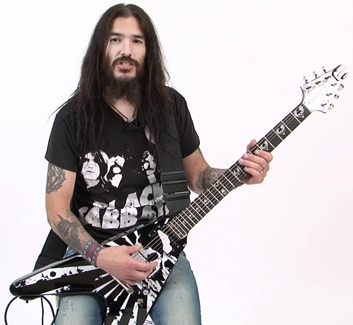 Robb and his Epiphone Signature "Love Death" Model
Robb and his Epiphone Signature "Love Death" Model |
|
|

